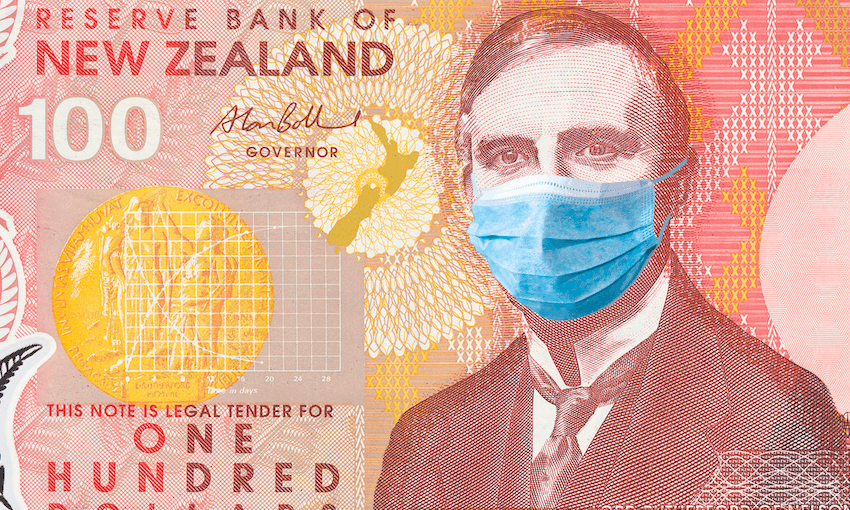Whether it’s a grant or a wage subsidy, industry leaders say Auckland businesses need government support.
With the mending glue barely having dried, some Auckland businesses will be cracking again under the pressure of the new level three lockdown. Now they are calling on the government to help.
Finance minster Grant Robertson has already hinted that should the lockdown be extended beyond midnight Friday there could be more government support for struggling businesses. This would most likely take the form of a targeted wage subsidy and would draw from the government’s spare $14b it has remaining from the initial Covid-19 response package.
But business leaders say that for many operators, three days with no cash flow will be severe enough to justify immediate compensation for that period alone.
“The issue will be getting through the three days,” Business NZ CEO Kirk Hope told The Spinoff.
“The questions is for those businesses that are public facing; that can’t operate contactless and have to shut down – bars restaurants, retail and so on – do they get some form of compensation for that three day period? I think they probably should, they deserve something. It should be a cash grant, to cover some of those costs for not being able to operate for three days.”
The sentiment was echoed by Retail New Zealand chief Greg Harford, who said the move to level three was a disaster for Auckland businesses, many of whom would have still been shaky from the first lockdown.
“Notwithstanding a good couple of months, retailers have been struggling to recover from the previous lockdown and remain in a very fragile state,” he said.
“Retail NZ thinks the government needs to make provision to provide grants to affected businesses to cover the current level three lockdown – and this will become more urgent if the lockdown goes beyond Saturday. Given the fragility of many businesses, the threshold for government support needs to be reduced so that direct grants are available to a greater number of businesses quickly.”
While Harford said there would inevitably be casualties from the three-day lockdown, it was too early to assess the scale of the damage.
Economists predict that the restrictions will cost Auckland $60m in lost GDP per day and the country $440m a week. Considering the nature of the level three restrictions, which allows some businesses like cafes and takeaway restaurants to continue operating in a contactless setting, the damage will invariably vary from business to business. Operations like gyms, salons and bars that aren’t able to operate at all will undoubtedly suffer the most.
Sara Higgins owns Hana, a clinic offering red light therapy and infrared saunas that opened only two months ago. Because she can’t trade, she’s losing about $1500 a day in revenue and cancelled bookings.
“We’ve had to close because we’re a customer-facing business. It was very sudden. To have a press conference late at night and allow three or four business hours to prepare to close is very stressful.”
While a government grant would allow her to continue paying her expenses when there’s no cash coming in, she said she’d definitely need some form of longer-term support if the lockdown is extended.
“I’ll probably cope for three days but not longer. I’ve got three staff to pay and no money coming in.”
While Higgins had managed to close her clinic and cancel or reschedule bookings yesterday without too much trouble, for hospitality businesses the process of closing is a complex and expensive operation.
“Businesses have had to close and grapple with food wastage – the equivalent to throwing money away,” said Julie White, CEO of Hospitality NZ.
“The ripple effect of Auckland going into level three has also resulted in hundreds of thousands of dollars in cancelled accommodation bookings throughout the country.
“To say this is a setback is an understatement.”
However, for other businesses that have been able to operate and continue trading through contactless orders, level three hasn’t been that bad so far.
Thomas Rapana runs a cafe in the west Auckland suburb of Titirangi. When news of level three broke he was able to immediately set up a contactless system where customers order and pay at the door and collect the coffee from a table. They also provide their details on a contact tracing form.
He said he’s had just as many, if not more, orders than normal in the first days of level three.
“It’s going great,” he said. “I’ve got two and a half pages of A4 refill full of names, so it’s been really successful.”
Rapana said he knows how hard it can be for businesses, having had to close his first cafe permanently during level four lockdown in March. Now with no staff – it’s just him working in his new cafe – it makes it easier to handle the shocks. However, he said he’s sure things are about to get much more difficult.
“I’m really fortunate down here because it’s just me. Of course, they’ll announce level four very soon and then I’ll be needing a subsidy.”
“I’ll make it maybe four weeks without wages, but it will probably be pretty desperate. But I’ll face that when it comes.
“Everyone knows what’s coming.”


